
|

|

| |

| |||

|

|
Global Warming, Imported Oil, Alternative Energy, and U.S. Security
2007 August 11

|

|

| |

| |||

|

|
 Under the pseudonym of George Orwell,
a young Englishman in poor health
with a generally-negative view of humanity's future,
Eric Arthur Blair,
spent the better part of 1944 through 1948
writing a book about his fears.
The book was called 1984
(reversing the last two digits of the year perhaps)
and it makes many wonderful points amid its gloom and doom.
While one may speculate on any of many of them
(like how the psychological control of society's youth
would come in the form of some
doofus
in a purple-dinosaur suit),
I would like to concentrate on one:
"The object of power is power."
Under the pseudonym of George Orwell,
a young Englishman in poor health
with a generally-negative view of humanity's future,
Eric Arthur Blair,
spent the better part of 1944 through 1948
writing a book about his fears.
The book was called 1984
(reversing the last two digits of the year perhaps)
and it makes many wonderful points amid its gloom and doom.
While one may speculate on any of many of them
(like how the psychological control of society's youth
would come in the form of some
doofus
in a purple-dinosaur suit),
I would like to concentrate on one:
"The object of power is power."
 When Ayn Rand dealt with the same issues
in The Fountainhead
and Atlas Shrugged,
she positioned the power seekers in the realm
of economic control of society.
It's a natural connection to make that
the route to control of people's wealth
is convincing them somebody else will make better use of it,
that somebody else deserves it more than they do.
When Ayn Rand dealt with the same issues
in The Fountainhead
and Atlas Shrugged,
she positioned the power seekers in the realm
of economic control of society.
It's a natural connection to make that
the route to control of people's wealth
is convincing them somebody else will make better use of it,
that somebody else deserves it more than they do.
In post-modern times we have a new power circle, the environmentalists. Rather than tell people about some community of poor people who deserve their wealth, an atmosphere of fear is created. Political fear can be defeated with enough cynicism, so ecological fear is used instead. Michael Crichton says it much better than I do in his essay on global warming and Hillsdale's Imprimis newsletter also says it better, but I'm going to put in my two cents anyway.
My conclusion is simple, we can respect the environment and protect the western world without ceding control to the power seekers who exploit our fear to their own ends.

|

| |

|
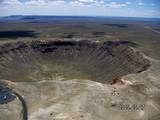
|

|
Maybe the earth is getting warmer and maybe it's caused by human effects on the environment and maybe that cause is carbon. That's what our governments tell us and they have government-funded data from government-funded labs in government-funded universities to confirm it. Howcum the same people who don't trust government in other areas seem to be so comfortable taking their word for it in this area?
Let's look at the list of environmental panics in the past few decades. There were
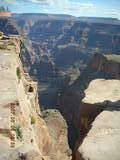 Sure, I'm afraid of climate changes
and other environmental destruction.
I'm afraid enough to give serious support to the
Nature Conservancy.
As I read their literature,
their position is the best way to save the environment is to buy it.
While the
Sierra Club
is
telling other people what to do with their land,
the Nature Conservancy raises money to buy the land.
[2010 April 19—The Nature Conservancy
has jumped on the global-warming bandwagon
and I have withdrawn my support for them.]
Sure, I'm afraid of climate changes
and other environmental destruction.
I'm afraid enough to give serious support to the
Nature Conservancy.
As I read their literature,
their position is the best way to save the environment is to buy it.
While the
Sierra Club
is
telling other people what to do with their land,
the Nature Conservancy raises money to buy the land.
[2010 April 19—The Nature Conservancy
has jumped on the global-warming bandwagon
and I have withdrawn my support for them.]
As afraid as I am of environmental impact to my way of life, I'm more afraid of political impact to my way of life from power seekers using the environment as a fear factor.

|

|

| |

|

|
 A position against the ecology political-power complex
is not the same as a position in favor
of oil consumption.
The secret of seizing political power
is having a cause people believe in
and the best way to do that is to pick something really
true.
Whatever alternative paths were available
in energy management may have been
available,
we're clearly in a worldwide energy
situation
in 2007.
A position against the ecology political-power complex
is not the same as a position in favor
of oil consumption.
The secret of seizing political power
is having a cause people believe in
and the best way to do that is to pick something really
true.
Whatever alternative paths were available
in energy management may have been
available,
we're clearly in a worldwide energy
situation
in 2007.
The United States has its roadways clogged with traffic with an ever-growing fraction of pickup trucks and so-called sport-utility vehicles (SUVs), all burning oil. A global economy means most of the world's goods have to get to an ocean and from an ocean, a lot of transportation requiring a lot of oil. In the United States, that load is shared between rail and over-the-road trucks. In India shipping is mostly small lorries driven jihad-style by small entrepreneurs who don't want to cede their independent shipping businesses to oil-efficient rail transport.
Urban China is moving from bicycle-based transportation to automobiles as their economy improves. Eastern Europe is joining their western counterparts on the roadways as their economies improve. If Africa ever gets its act together, then they're going to want to drive to their seat at the western-economy table. Attempts to curtail these increases may have the sanctity of environmental concern but are tainted with the sanctimony of those already here denying entry to newcomers.
 There's a lot of oil left in the ground, true,
but that's hardly a mandate to use it all up.
There's a lot of oil left in the ground, true,
but that's hardly a mandate to use it all up.
Burning oil is still the preferred way to heat our homes, to move ourselves from one place to another, and to generate electricity for other things. An oil-based economy is cheap and convenient.
 The worst-case of fossil-fuel consumption is dirty
with
lots of soot, carbon monoxide (CO),
oxides of nitrogen (NOx), ozone (O3),
and other nasty stuff.
Clean oil use converts hydrocarbons into
carbon dioxide (CO2) and water (H2O).
Whether or not increased CO2 emissions
change our climate,
they're not likely to be a good thing
for our planet.
The worst-case of fossil-fuel consumption is dirty
with
lots of soot, carbon monoxide (CO),
oxides of nitrogen (NOx), ozone (O3),
and other nasty stuff.
Clean oil use converts hydrocarbons into
carbon dioxide (CO2) and water (H2O).
Whether or not increased CO2 emissions
change our climate,
they're not likely to be a good thing
for our planet.
The bad news is that oil may be plentiful for the moment, but it's probably going to run out someday. In the meantime, increasing demand for a decreasing resource will concentrate power in the hands of those who own the resource. Whether these are the same Arabs who blew up buildings in London and New York City or the same American executives who piloted our economy into non-productive dependence on Asian innovation and manufacturing, I don't have a warm feeling about giving them more control of my life.
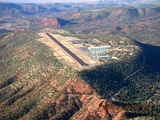
|

|

|

|

|
 So what's the problem?
Let's just stop using oil.
That'll teach the Arabs and the multinational corporations
a thing or two.
We'll live a happier, purer, holistic, synergistic existence that way.
So what's the problem?
Let's just stop using oil.
That'll teach the Arabs and the multinational corporations
a thing or two.
We'll live a happier, purer, holistic, synergistic existence that way.
The great, big problem is we like the things oil does for us. Besides keeping us warm in the winter and cool in the summer, besides transporting us where we want to go, oil is the fundamental ingredient in plastics that we like to have. Realistically, we're not going to go back to nature's commune, at least not without great protest. The hippies may enjoy their protests, but they still want us to manufacture their tie-dyed T-shirts and make iPods so they can listen to their electric-guitar songs of protest.
I believe that we can relieve the oil pressure problem if we can get energy from somewhere else.
 Nuclear energy has always been the Great White Hope
of electric power generation.
The Atomic Energy Commission (AEC)
(which became the Nuclear Regulatory Commission (NRC)
when "atomic" became a nasty word)
promised electricity "too cheap to meter"
in exchange for public support for "the peaceful atom."
Positive:
We know how to make nuclear power plants.
Negative:
Nasty waste-disposal problems,
a highly-politicized regulatory structure,
and military-threat issues around nuclear fuel.
I don't see hydrogen-fusion happening anytime soon.
Nuclear energy has always been the Great White Hope
of electric power generation.
The Atomic Energy Commission (AEC)
(which became the Nuclear Regulatory Commission (NRC)
when "atomic" became a nasty word)
promised electricity "too cheap to meter"
in exchange for public support for "the peaceful atom."
Positive:
We know how to make nuclear power plants.
Negative:
Nasty waste-disposal problems,
a highly-politicized regulatory structure,
and military-threat issues around nuclear fuel.
I don't see hydrogen-fusion happening anytime soon.
Geologic sources, damming rivers and underground thermal sources are a natural place to look for natural power. Positive: Low pollution, long-term "green" power generation. Negative: Dam-created lakes often replace sensitive ecosystems.
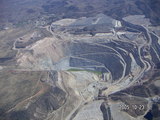 Coal is the old standby in the United States.
We have a lot of it,
we know how to mine it,
and we know how to use it.
There are cleaner but more expensive ways to use it,
but it still looks black and dirty,
so the environmentalists don't like it.
The climate-change zealots also don't like it
because using coal for energy
is at least as carbon-intensive as the oil
we're trying to replace.
Positive:
Enormous supply, well known technology.
Negative:
Dirty emissions and ugly mines,
at least as much CO2 as oil.
Coal is the old standby in the United States.
We have a lot of it,
we know how to mine it,
and we know how to use it.
There are cleaner but more expensive ways to use it,
but it still looks black and dirty,
so the environmentalists don't like it.
The climate-change zealots also don't like it
because using coal for energy
is at least as carbon-intensive as the oil
we're trying to replace.
Positive:
Enormous supply, well known technology.
Negative:
Dirty emissions and ugly mines,
at least as much CO2 as oil.
Sun power, photoelectric generation, makes everybody feel good. One of the simplest sun-powered energy systems makes hot water with black, roof-mounted, pipe panels, but electricity is the usual picture. Positive: The sun belt can power its air conditioners while the sun shines, nobody has to see ugly solar cells on flat rooftops. Negative: There may be environmental issues in manufacture and disposal, nasty chemical processes.
 We can use electricity for households,
but an alternative is to turn water (H2O)
into hydrogen (H2) while releasing oxygen (O2).
Hydrogen is hard to transport and to store
and has a bad reputation,
but it's actually quite safe.
As I understand it,
a hydrogen-car fire makes a big blue bang
above a collision.
The infamous
Hindenberg
explosion that killed all those people was the paint burning
while the much-maligned hydrogen rose into the air and burned up high.
If we started with a hydrogen-fuel automotive economy,
then I suspect it would have been a tough-sell to get people
comfortable with the extra danger of heavier-than-air fuel.
Positive:
Clean and safe in auto-fuel-tank quantities,
no carbon to annoy global-warming crowd.
Negative:
Hydrogen is difficult to store
and requires a new, expensive infrastructure
for transport and storage.
The equivalent of a hand-held gasoline container
would require a container capable of scuba-diving-tank pressures.
We can use electricity for households,
but an alternative is to turn water (H2O)
into hydrogen (H2) while releasing oxygen (O2).
Hydrogen is hard to transport and to store
and has a bad reputation,
but it's actually quite safe.
As I understand it,
a hydrogen-car fire makes a big blue bang
above a collision.
The infamous
Hindenberg
explosion that killed all those people was the paint burning
while the much-maligned hydrogen rose into the air and burned up high.
If we started with a hydrogen-fuel automotive economy,
then I suspect it would have been a tough-sell to get people
comfortable with the extra danger of heavier-than-air fuel.
Positive:
Clean and safe in auto-fuel-tank quantities,
no carbon to annoy global-warming crowd.
Negative:
Hydrogen is difficult to store
and requires a new, expensive infrastructure
for transport and storage.
The equivalent of a hand-held gasoline container
would require a container capable of scuba-diving-tank pressures.
 I had to chuckle at a proposal
to use solar cells to generate electricity
for water decomposition.
It was titled "Solar Hydrogen."
Are we really going to go to the sun to get hydrogen?
It can get pretty hot up there.
Then I figured out how to avoid the intense
heat—we can go at night.
I had to chuckle at a proposal
to use solar cells to generate electricity
for water decomposition.
It was titled "Solar Hydrogen."
Are we really going to go to the sun to get hydrogen?
It can get pretty hot up there.
Then I figured out how to avoid the intense
heat—we can go at night.
Ethanol is hailed as a low-carbon, environmentally-friendly fuel since it comes from corn that grows in the ground. The corn market is all screwed up by U.S. Federal regulation, so who knows if it makes sense to use it for fuel rather than food. Until the global-warming craze, the subsidized corn grown here in the States became nearly-free food for Mexico where government regulation and lack of social infrastructure makes it difficult to invest in an agricultural or industrial future. The bad news is that U.S. corn uses more oil (and more carbon) to grow corn than it saves as fuel, but ethanol from Central America or South America gets most its carbon from the CO2 in atmosphere. Positive: From the right source, a convenient way to grow fuel. Negative: Current sources use more oil and more carbon than burning gasoline the old-fashioned way. Also, ethanol is heavier than gasoline per unit energy output and most engines are designed for gasoline rather than ethanol.
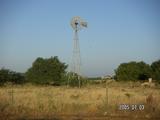 Wind power has been around for a long time.
Holland is famous for its charming windmills in the countryside.
The day-night shift in solar energy on our rotating planet
ensures a long-term energy source.
The variation in wind is significant,
day-to-night, season-to-season, and
climate and weather,
so some kind of energy storage has to be part of the wind-power plan.
Today's high-tower, aerodynamic-blade, efficient windmills
have come a long way from the Dutch countryside.
Covering ten percent of the U.S. prairie with windmills
would make up our oil deficit
with all the wind variation and energy storage
taken into account.
Some people say birds fly into the blades,
but I don't know if that's factual or anecdotal.
Positive:
Well understood, well developed technology,
very "green" (environmentally friendly).
Negative:
It takes a lot of windmills over a large area
to get a lot of power,
the same people who mind
strip-mining significant areas of the United States for coal
may also mind covering more-significant areas with windmills.
Wind power has been around for a long time.
Holland is famous for its charming windmills in the countryside.
The day-night shift in solar energy on our rotating planet
ensures a long-term energy source.
The variation in wind is significant,
day-to-night, season-to-season, and
climate and weather,
so some kind of energy storage has to be part of the wind-power plan.
Today's high-tower, aerodynamic-blade, efficient windmills
have come a long way from the Dutch countryside.
Covering ten percent of the U.S. prairie with windmills
would make up our oil deficit
with all the wind variation and energy storage
taken into account.
Some people say birds fly into the blades,
but I don't know if that's factual or anecdotal.
Positive:
Well understood, well developed technology,
very "green" (environmentally friendly).
Negative:
It takes a lot of windmills over a large area
to get a lot of power,
the same people who mind
strip-mining significant areas of the United States for coal
may also mind covering more-significant areas with windmills.
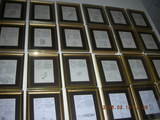 There is a common thread to all of these energy solutions:
They all require serious investment in something
other than computer software.
The present trend of bright, American youth
going into business administration
(MBA) or
Computer Science
isn't going to solve our energy problem.
We're going to have to build big companies
and we're going to have to run them
as well as we did forty years ago
if we want to make these happen.
There is a common thread to all of these energy solutions:
They all require serious investment in something
other than computer software.
The present trend of bright, American youth
going into business administration
(MBA) or
Computer Science
isn't going to solve our energy problem.
We're going to have to build big companies
and we're going to have to run them
as well as we did forty years ago
if we want to make these happen.
Also, the government isn't going to solve our energy problem.
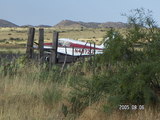
|

|

|
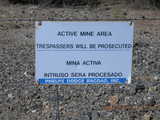
|

|
 Even if I reject the general panic
surrounding global warming, climate change,
and other political frenzy,
I have a fervent cause along these lines:
The security of the United States is at stake.
Maybe the rest of the western-civilized world is at stake, too.
Even if I reject the general panic
surrounding global warming, climate change,
and other political frenzy,
I have a fervent cause along these lines:
The security of the United States is at stake.
Maybe the rest of the western-civilized world is at stake, too.
America isn't about waving flags or guzzling gas, not about displays of patriotism or conspicuous consumption. America is about freedom. Our founding fathers figured it out early, political freedom is a joke without economic freedom.
 Let me give an example with a story
(my usual style of discourse).
Like many post-modern big companies,
my company has a big "empowerment" campaign,
employees, whom we call "colleagues,"
should feel empowered in a way they do not feel right now.
What's fundamentally missing in their equation is
one can only be empowered to do something
if there is something one wishes to do.
I can do
anything
I want at my company
which sounds great until one realizes that my organization
hasn't a clue as to what it's trying to accomplish.
Let me give an example with a story
(my usual style of discourse).
Like many post-modern big companies,
my company has a big "empowerment" campaign,
employees, whom we call "colleagues,"
should feel empowered in a way they do not feel right now.
What's fundamentally missing in their equation is
one can only be empowered to do something
if there is something one wishes to do.
I can do
anything
I want at my company
which sounds great until one realizes that my organization
hasn't a clue as to what it's trying to accomplish.
Maybe our country is suffering from the same post-modern disease. We're so busy whining that we have no control over our destinies that we've forgotten that the prerequisite for that control is having somewhere we want those destinies to take us. (Remember how unified we Americans felt about the Space Race?) Our country is vulnerable because we are pitifully dependent on other countries to provide the basic goods and services we depend on. Well, let me give America a mission right here and right now.
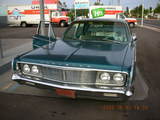 I want the United States of America
to become a productive power in the world,
to become the dominant productive power in the world
by 2015.
I want us to make more stuff and better stuff than anybody else.
I want my country to have the hardest and smartest working people
doing the best jobs on this planet.
I want the United States of America
to become a productive power in the world,
to become the dominant productive power in the world
by 2015.
I want us to make more stuff and better stuff than anybody else.
I want my country to have the hardest and smartest working people
doing the best jobs on this planet.
On 1973 October 17 the Arabs told us how much oil we could have and we didn't like it. Our response should have been drastically to reduce our regulation in energy so our oil producers could produce at market prices. Instead, our response was to lose our national vision, to end our space-exploration programs, and to make social changes that should nauseate any sentient being who has lived on this planet since the Renaissance. We put Dilbert-style idiots in charge of our companies with predictable and predicted results.
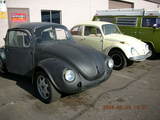 We ceded our consumer electronics to the Japanese who,
fortunately,
were more interested in their own dominance
than in the enormous wealth they gave to us.
With the collapse of Japan,
we now depend on China for several percentage points
of our economy.
Again, we can only hope they don't figure out
that they will never be paid,
that balance of trade is a euphemism for foreign aid.
We ceded our consumer electronics to the Japanese who,
fortunately,
were more interested in their own dominance
than in the enormous wealth they gave to us.
With the collapse of Japan,
we now depend on China for several percentage points
of our economy.
Again, we can only hope they don't figure out
that they will never be paid,
that balance of trade is a euphemism for foreign aid.
I plan to have a more-specific prescription for saving western civilization later on.
If the United States wants to be safe at night, then we have to be the masters of our own destiny. I'm a lot less worried about military domination than our inability to feed ourselves, to make our own consumer-electronics toys, to run our companies with more-than-simean intelligence, and to manufacture the infrastructure we depend on. Energy independence and manufacturing capability are two really-good places to start.
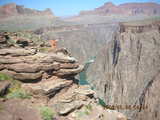
|

| |

|

|

|
|
15:37:08 Mountain Standard Time (MST). 1101 visits to this web page. |